Brainymaniac
On this page, you find all documents, package deals, and flashcards offered by seller BrainyManiac.
- 725
- 0
- 29
Community
- Followers
- Following
2 Reviews received
756 items
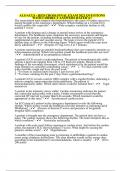
ALS/ACLS - RED CROSS FINAL EXAM 2021 QUESTIONS WITH CORRECT ANSWERS RATED A+
The resuscitation team suspects that hyperkalemia is the cause of cardiac arrest in a patient brought to the emergency department. Which finding on a 12-lead ECG would confirm this suspicion? - Wide-complex ventricular rhythm or tall, pointed T waves A patient with dyspnea and a change in mental status arrives at the emergency department. The healthcare team completes the necessary assessments and begins to care for the patient, including initiating cardiac monitoring, pulse oximetry, supp...
- Exam (elaborations)
- • 5 pages •
The resuscitation team suspects that hyperkalemia is the cause of cardiac arrest in a patient brought to the emergency department. Which finding on a 12-lead ECG would confirm this suspicion? - Wide-complex ventricular rhythm or tall, pointed T waves A patient with dyspnea and a change in mental status arrives at the emergency department. The healthcare team completes the necessary assessments and begins to care for the patient, including initiating cardiac monitoring, pulse oximetry, supp...
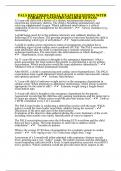
PALS TEST QUESTIONS WITH CORRECT SOLUTIONS GRADED TO PASS
PALS TEST QUESTIONS WITH CORRECT SOLUTIONS GRADED TO PASS
- Package deal
- • 18 items •
- PALS ALL QUESTIONS WITH CORRECT ANSWERS GRADED TO PASS • Exam (elaborations)
- PALS UPDATED FINAL EXAM QUESTIONS WITH CORRECT ANSWERS GRADED TO PASS • Exam (elaborations)
- 50 QUESTIONS WITH CORRECT ANSWERS RATED A+, PALS • Exam (elaborations)
- PALS POST TEST QUESTIONS WITH CORRECT ANSWERS GRADED TO PASS • Exam (elaborations)
- PALS CERTIFICATION COURSE QUESTIONS WITH CORRECT ANSWERS GRADED TO PASS • Exam (elaborations)
- And more ….
PALS TEST QUESTIONS WITH CORRECT SOLUTIONS GRADED TO PASS

PALS RED CROSS FINAL EXAM QUESTIONS WITH CORRECT ANSWERS GRADED TO PASS
A 5-year-old child with a history of a chronic neuromuscular disease is experiencing respiratory distress. The child is breathing spontaneously and receiving supplemental oxygen. Which additional intervention is a critical component of airway management for this patient? - Airway clearance (e.g., suctioning) A child being cared for in the pediatric telemetry unit suddenly displays the following ECG waveform. The provider prepares to intervene because the child is demonstrating which type o...
- Package deal
- Exam (elaborations)
- • 5 pages •
A 5-year-old child with a history of a chronic neuromuscular disease is experiencing respiratory distress. The child is breathing spontaneously and receiving supplemental oxygen. Which additional intervention is a critical component of airway management for this patient? - Airway clearance (e.g., suctioning) A child being cared for in the pediatric telemetry unit suddenly displays the following ECG waveform. The provider prepares to intervene because the child is demonstrating which type o...
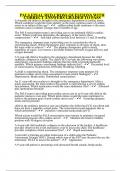
PALS FINAL RED CROSS QUESTIONS WITH CORRECT ANSWERS GRADED TO PASS
A 4-month old infant is brought to the emergency department in cardiac arrest. Which condition would the team identify as the most common cause of cardiac arrest in an infant of this age? - sudden infant death syndrome is the most common cause in infants younger than 6 months of age. The PALS resuscitation team is providing care to an intubated child in cardiac arrest. Which result best determines the adequacy of the team's chest compressions? - End-tidal carbon dioxide level between 1...
- Package deal
- Exam (elaborations)
- • 5 pages •
A 4-month old infant is brought to the emergency department in cardiac arrest. Which condition would the team identify as the most common cause of cardiac arrest in an infant of this age? - sudden infant death syndrome is the most common cause in infants younger than 6 months of age. The PALS resuscitation team is providing care to an intubated child in cardiac arrest. Which result best determines the adequacy of the team's chest compressions? - End-tidal carbon dioxide level between 1...
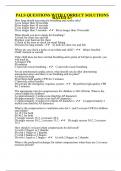
PALS QUESTIONS WITH CORRECT SOLUTIONS RATED A+
How long should assessing for breathing and a pulse take? A) no longer than 20 seconds B) no longer than 10 seconds C) no longer than 15 seconds D) no longer than 5 seconds - B) no longer than 10 seconds What should you do to check for breathing? A) look for chest rise and fall B) place your hand on the chest C) look at the nose to check for nasal flaring D) listen for lung sounds - A) look for chest rise and fall Where do you check a pulse on an infant and child? - Infant...
- Package deal
- Exam (elaborations)
- • 17 pages •
How long should assessing for breathing and a pulse take? A) no longer than 20 seconds B) no longer than 10 seconds C) no longer than 15 seconds D) no longer than 5 seconds - B) no longer than 10 seconds What should you do to check for breathing? A) look for chest rise and fall B) place your hand on the chest C) look at the nose to check for nasal flaring D) listen for lung sounds - A) look for chest rise and fall Where do you check a pulse on an infant and child? - Infant...
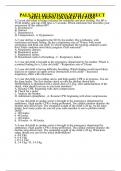
PALS 2021 QUESTIONS WITH CORRECT SOLUTIONS GRADED TO PASS
A 2 week old infant is being evaluated for irritability and poor feeding. His BP is 55/40 mmHg, and cap refill time is 5 seconds. Which statement best describes your assessment of this infants BP? A. Hypotensive B. Normal C. Hypertensive D. Compensated - A. Hypotensive A 3 year old boy is brought to the ED by his mother. His is lethargic, with retractions and nasal flaring. He has a respiratory rate of 70/min, with warm extremities and brisk cap refill. To which immediate life treating ...
- Package deal
- Exam (elaborations)
- • 7 pages •
A 2 week old infant is being evaluated for irritability and poor feeding. His BP is 55/40 mmHg, and cap refill time is 5 seconds. Which statement best describes your assessment of this infants BP? A. Hypotensive B. Normal C. Hypertensive D. Compensated - A. Hypotensive A 3 year old boy is brought to the ED by his mother. His is lethargic, with retractions and nasal flaring. He has a respiratory rate of 70/min, with warm extremities and brisk cap refill. To which immediate life treating ...
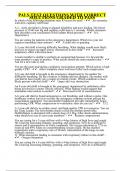
PALS TEST QUESTIONS WITH CORRECT SOLUTIONS GRADED TO PASS
In which of the following situations may IO access be used? - An extremity with slow capillary refill time. A 2 - week old infant is being evaluated irritability and poor feeding. His blood pressure is 55/40 mm Hg and capillary refill time is 5 seconds. Which statement best describes your assessment of this infants blood pressure? - It is Hypotensive You are caring for patients in the emergency department. Which two year old requires immediate interventions? - A child who is grunt...
- Package deal
- Exam (elaborations)
- • 6 pages •
In which of the following situations may IO access be used? - An extremity with slow capillary refill time. A 2 - week old infant is being evaluated irritability and poor feeding. His blood pressure is 55/40 mm Hg and capillary refill time is 5 seconds. Which statement best describes your assessment of this infants blood pressure? - It is Hypotensive You are caring for patients in the emergency department. Which two year old requires immediate interventions? - A child who is grunt...
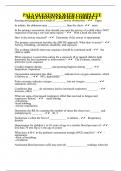
PALS QUESTIONS WITH COMPLETE SOLUTIONS VERIFIED CORRECT
Snoring and gurgling are a result of _____ airway obstruction. - Upper In infants, the abdomen may _____________ than the chest - more In the primary assessment, how should you open the airway of a child who is NOT suspected of having a cervical spine injury? - With a head tilt-chin lift How is the airway assessed? - Determine if the airway is open/patent The primary assessment includes the ABCDE approach. What does it assess? - Airway, breathing, circulation, disabili...
- Package deal
- Exam (elaborations)
- • 3 pages •
Snoring and gurgling are a result of _____ airway obstruction. - Upper In infants, the abdomen may _____________ than the chest - more In the primary assessment, how should you open the airway of a child who is NOT suspected of having a cervical spine injury? - With a head tilt-chin lift How is the airway assessed? - Determine if the airway is open/patent The primary assessment includes the ABCDE approach. What does it assess? - Airway, breathing, circulation, disabili...
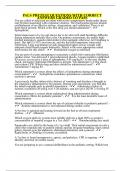
PALS PRETEST QUESTIONS WITH CORRECT ANSWERS GRADED TO PASS
You are called to help treat an infant with severe symptomatic bradycardia (heart rate 66/min) associated with respiratory distress. The bradycardia persists despite establishment of an effective airway, oxygenation, and ventilation. There is no heart block present. Which is the first drug you should administer? - Epinephrine Initial impression of a 2yo girl shows her to be alert with mild breathing difficulty during inspiration and pale skin color. On primary assessment, she makes high-pi...
- Package deal
- Exam (elaborations)
- • 4 pages •
You are called to help treat an infant with severe symptomatic bradycardia (heart rate 66/min) associated with respiratory distress. The bradycardia persists despite establishment of an effective airway, oxygenation, and ventilation. There is no heart block present. Which is the first drug you should administer? - Epinephrine Initial impression of a 2yo girl shows her to be alert with mild breathing difficulty during inspiration and pale skin color. On primary assessment, she makes high-pi...
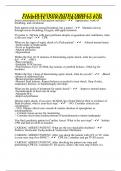
PALS, QUESTIONS WITH CORRECT AND COMPLETE ANSWERS GRADED TO PASS
Initial assessment of a Peds patient includes? - Appearance, work of breathing, and circulation Peds patient with no normal breathing, but a pulse? - Maintain airway through rescue breathing, Oxygen, and apply monitors. If a pulse is <60/min with poor perfusion despite oxygenation and ventilation, what is the next step? - CPR What are the signs of septic shock of a Peds patient? - -Altered mental status -Tachycardia or bradycardia -Fever or hypothermia -Altered perfus...
- Package deal
- Exam (elaborations)
- • 5 pages •
Initial assessment of a Peds patient includes? - Appearance, work of breathing, and circulation Peds patient with no normal breathing, but a pulse? - Maintain airway through rescue breathing, Oxygen, and apply monitors. If a pulse is <60/min with poor perfusion despite oxygenation and ventilation, what is the next step? - CPR What are the signs of septic shock of a Peds patient? - -Altered mental status -Tachycardia or bradycardia -Fever or hypothermia -Altered perfus...

TNCC: TRAUMA NURSING PROCESS QUESTIONS WITH CORRECT ANSWERS RATED A+
NHA PCT MODULE 1 QUESTIONS WITH CORRECT ANSWERS